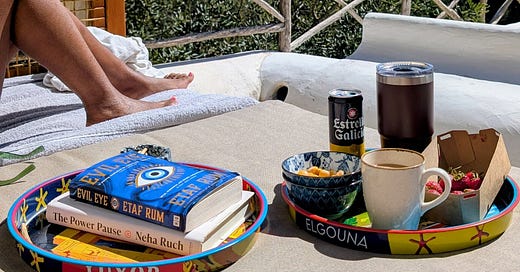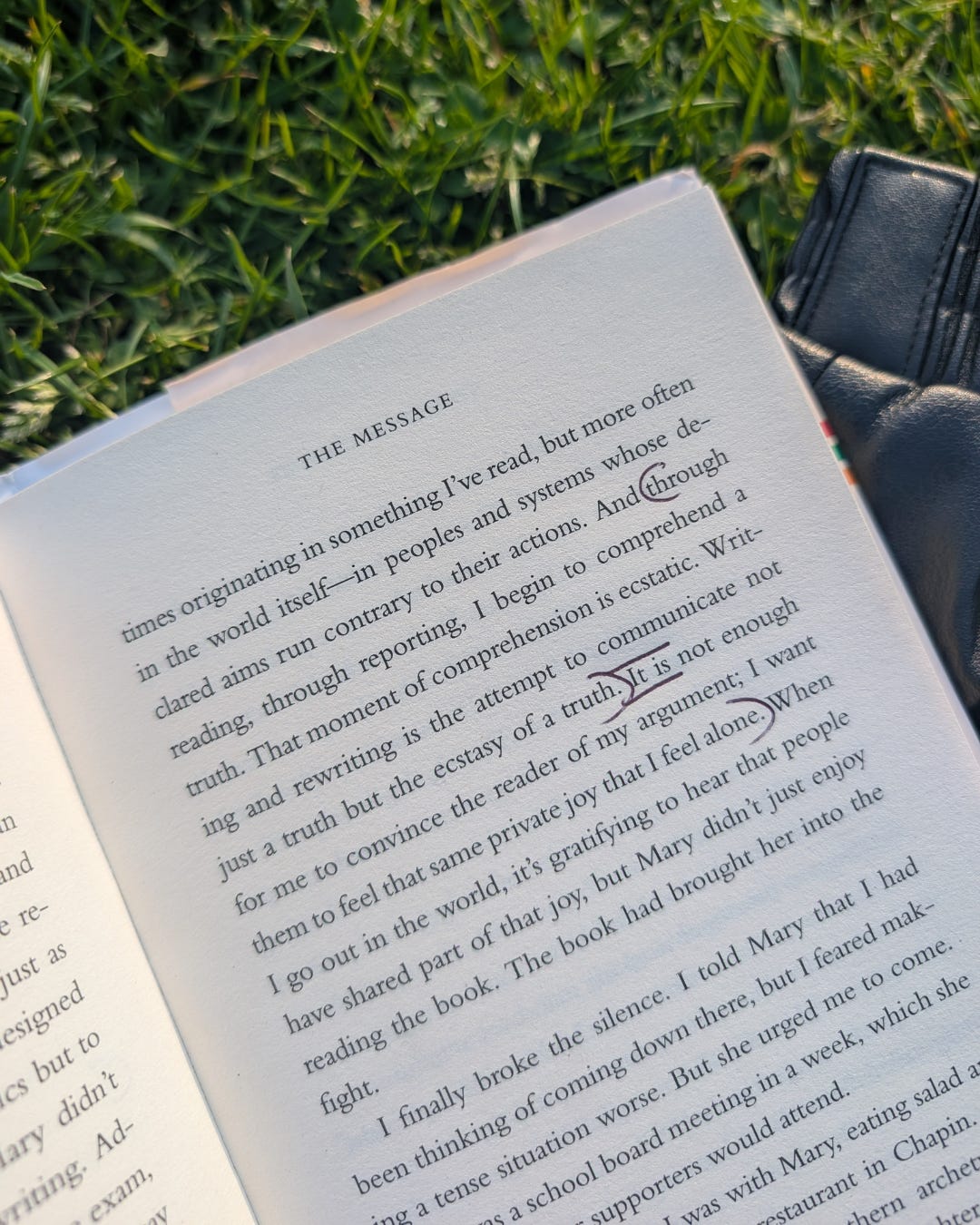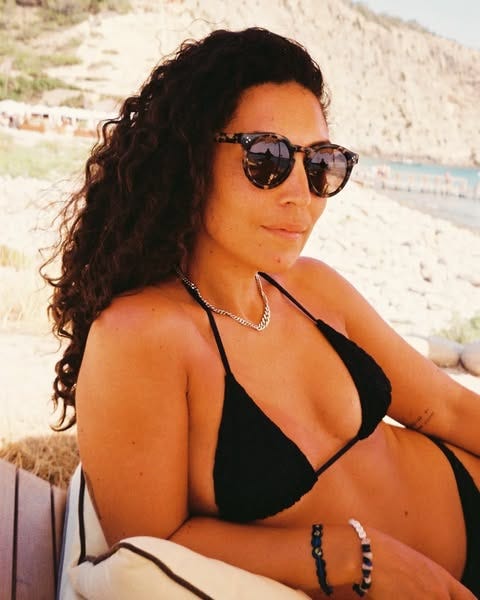There are two stages to a book entering my life. First, into my house. Then, into my hands. The second part only happens when I’m ready for it.
Choosing what to read next is one of the few things I do without overthinking. Without trying to get it right. I just follow the pull. And so, every reading season ends up reflecting exactly where I am - emotionally, creatively, even spiritually - whether I realise it at the time or not.
I began Q2 having just submitted what felt like the truest version of my novel. I say felt like because you never really know - but for the first time, it didn’t feel as much like a draft. It felt like the book it was meant to be. And then came the wait. The hope for affirmation of this thing I had created. A hope that it was true that it was what I saw in my mind. The thing that had warranted all this. That had transformed me.
I went to Ibiza with Rox, one of my best friends. We’re often on the same page, and this time we absolutely were: all we wanted was to eat, explore, sleep, chill, and read. So that’s what we did. It was perfection. And I got the opportunity to dive into some great fiction by Arab women. I hadn’t been able to read fiction in months. I couldn’t hear too many other character’s voices when trying to hear my character’s, I suppose.
First up was Evil Eye, by Etaf Rum, which I picked up at The Candid Book Club festival late last year, where Etaf was speaking alongside Yasmin Zaher, author of The Coin (which I’ve also got on my shelf but haven’t read yet!). They spoke brilliantly about the responsibility of telling stories as Palestinian women and the weight and politics of representation.
Etaf’s latest follows Yara, a Palestinian-American woman who seemingly has it all: a husband, children, a good job. But beneath the surface, she’s haunted by rage, repression, and a feeling of being deeply disconnected from herself. When she begins seeing a therapist, her buried memories start to surface, and with them, an unraveling. It was gorgeous and felt so aligned with the questions I’ve been circling lately - around womanhood, legacy, silence, and what gets passed down.
From there I read An Unlasting Home, by Mai Al-Nakib, which I found truly masterful. It moved between generations, countries, and inner worlds with such ease and tenderness, opening with a woman on trial in present-day Kuwait for blasphemy - and then unspooling into a rich, layered story about the personal and the political through generations. I loved how it held so many so-called taboos - sexuality, religion, resistance - with such grace and complexity.
After the break, I was back in London and had to settle into the waiting - less distracted, now, by being away and out of my routine - the routine that, for months and seemingly whole lifetimes had consisted of writing this book. What the fuck was I supposed to do now?
I read The Message, by Ta-Nehisi Coates, maybe as a way to tether myself. To remember what comes behind and before the writing.
Addressed to his writing students, the book is a powerful exploration of language - and the weight and responsibility of it. About how art is never neutral. It’s something I’ve really come to understand more deeply over the last couple of years, witnessing the absolute gaslighting of the mainstream media when it comes to Palestine - something Coates tackles head-on in this book.
In the final section of the book, Coates visits Palestine, writing for the first time plainly and bravely on what he sees there; reckoning with his own previous blindness to the truth, having believed the stories he had been fed. Having furthered the Zionist regime inadvertently by buying into it.
He reminds his students - and by extension, all of us - that the role of the writer is not to make the truth palatable. It’s to tell it. Especially when it’s difficult. Especially when it disrupts. His words carry such clarity and weight. They remind you that writing, when done well, doesn’t just describe the world - it demands something of it.
I then fell into a bit of a reading / life slump. I was just so exhausted. But I couldn’t allow myself to chill even for a second; kept confusing rest with laziness, searching for the next goal. - But I had just done something. Had just written a whole fucking book and transformed in the process. I needed to chill.
I picked up and discarded loads of books over the following month or so. There were a few that managed to hold my attention:
Things We Do Not Tell The People We Love, by Huma Qureshi: A short story collection “about our most intimate relationships, and the secrets, misunderstandings and silences that haunt them.” It was beautiful and sad and searing, and just right for my scattered brain.
Then: Idol, by Louise O’Neill, which asks: what would you do to be adored? And: what happens when that adoration turns?
It follows a wellness influencer who’s built her brand on empowerment and sisterhood, until an accusation from her past threatens to unravel it all. I read it around the same time I watched that docuseries about the YouTuber who adopted a child from overseas and then… didn’t keep him. It all got me thinking about influence, performance, the machinery behind a curated self. How much of what we share is really ours? What happens when you start confusing visibility with love?
The counter to all that noise - the craving, the collapse, the constant pressure of moremoremore-next - was The Ambition Trap: How to Stop Chasing and Start Living, by Amina Al-Tai. It offered the reframing I needed.
Amina is an American-Iraqi leadership coach who works at the intersection of business, wellbeing, and purpose. The book doesn’t tell you to stop being ambitious, but to understand where it comes from, and learn to harness it in a way that doesn’t deplete you. In a way that you can use it for good. It spoke to the part of me that feels behind. The one that confuses worth with output. And the exercises were deeply clarifying.
Then I thought: okay, let me read some stuff by men. The vast majority of books I read are by women because - duh. That’s been a conscious choice for years. It’s what I’m drawn to. It’s what I want to support. But I first started to think that maybe that wasn’t quite the flex I thought it was when I read a piece by
, where she referenced an article by Richard Morris, who made the case that the decline of men in literary fiction isn’t necessarily something to celebrate.He argues that while male dominance in literature is - thankfully - over, the rise of the manosphere has coincided with a cultural collapse in male emotional and intellectual literacy. That as fewer young men read fiction, more are turning to figures like Andrew Tate and Joe Rogan for their worldview.
Pandora doesn’t agree with all of it - but she makes an important point: reading only women isn’t a feminist badge of honour. It too can become a different kind of echo chamber. Plus, men are also victims of patriarchy. I wanted to examine this wound from another angle. I wanted to hear how men were narrating themselves.
At the Candid Book Club festival, I had attended a panel on masculinity with Iggy London, Ian Russell-Hsieh, and
, and was struck by how open, nuanced, and emotionally honest they were - how much I wanted to hear more of that. I had picked up their books, which I now read one after the other, starting with J.J Bola’s Mask Off: Masculinity Redefined. It felt like a solid, accessible entry point into some important questions: Why are men taught not to feel? What myths are they raised on? How do we make space for better models?Then, I'm New Here, by Ian Russel-Hsieh which is about a Taiwanese-British guy who is plagued by insecurities and therefore behaves like - for lack of a better word - quite the fuck boy. I found it sad, sometimes frustrating, but mostly tender in a way that snuck up on me.
Mandem, edited by Iggy London, was next - a collection of essays from Black British men, each exploring what it means to move through the world - in their bodies, in their cities, in their homes. There was something incredibly generous about how the book held complexity: softness and shame, masculinity and grief, fatherhood and fragility. I especially loved
’s essay - I’ve been loving everything he’s been saying lately, and definitely need to read his book Avoidance, Drugs, Heartbreak and Dogs.(If you have any reccs - books by men that made you feel or see something - please send them my way. Especially fiction!)
It was June, suddenly, and I was back in Ibiza again with my girls after having finally received feedback from my agent (yay! It was what I thought it was! It was almost ready to enter the next stage of its attempts to exist in the world!) and done a quick turnaround of the last tiny bits of edits. The universe had timed it perfectly. The next stage was going to be petrifying and exciting. I was glad to be away and distracted.
I wanted to read something escapist, so I picked up Leave the World Behind by Rumaan Alam. Let’s just say that the apocalyptic vibes were not what I needed. A family rents a holiday home; the world outside starts to unravel. There’s no real explanation, just atmosphere and unease. It stays like that all the way through. It was slightly too close to home, tbh. And yet I couldn’t put it down.
Next, I read The Husbands, by Chandler Baker - another attempt to escape the real world, I suppose. A kind of reverse Stepford Wives - set in a suburban utopia where high-achieving women are supported by eerily perfect, domesticity-savvy husbands.
I liked the concept more than the execution, but I most enjoyed the commentary about the mental load women take on; how much women still carry, even in the most “equal” partnerships. And about the slow, creeping compromises that shape our lives. There’s a passage where the main character starts to wonder if her resentment is the problem - or if the problem is actually real and I - !
My birthday gift was snapping out of my reading funk with the release of The Dry Season: Finding Pleasure in a Year Without Sex, by Melissa Febos which is very much what the title suggests, and also so much more.
In the wake of yet another relationship, Melissa decides to take a break - from dating, relationships, sex, all of it. What begins as a three-month pause soon becomes a full year of celibacy. Her friends laugh. Three months? That’s nothing. But for Melissa, who’d been entangled in one relationship or another since her teens, it was radical. It was an invitation to ask: Who am I when I’m not being chosen? What does pleasure feel like when it isn’t filtered through another person’s gaze?
She writes so piercingly about untraining herself from the need to be seen, validated and wanted. About how we confuse desire with being desired. She roots female sovereignty in a long and powerful lineage. It echoed so much of what I’ve been sitting with lately and I just ADORE how she writes.
I felt the same awe when I read Girlhood earlier this year. It helped click so many things into place - things I needed in order to finish my own novel. Reading her feels like being witnessed and stretched at the same time. I’m so glad I still have more of her back catalogue to get through.
To end the quarter, I dug into Gold Rush, by Olivia Petter. I’ve always enjoyed her journalism and the kinds of topics she interrogates so I was looking forward to this one. And it didn’t disappoint.
It’s about a young woman, Rose, who wakes up after a night with the most famous man on the planet - except she can’t quite remember what happened. What follows is a page-turning exploration of consent, celebrity culture, and the ways we allow power - especially male, especially famous- to distort everything. It was the perfect final read of the quarter.
Looking back, I think this quarter has been about transition. The space between things. Letting go of what was, and not quite knowing what’s coming.
The books I read became companions to that - holding questions about visibility, desire, inheritance, ambition, collapse. Stories of women reclaiming themselves. Men learning to speak honestly.
Together, they mirrored the unravelling and the reassembling. Tentatively re-emerging. Trusting the universe, even when it feels quiet. Alhamdullilah.
What have you been reading / thinking about recently? Leave a comment or press ‘reply’ to this email to write to me directly.
-Alya xo
About Me:
I’m Alya Mooro, a writer and the bestselling author of The Greater Freedom: Life as a Middle Eastern Woman Outside the Stereotypes. My work explores identity, self-discovery, and what it means to live in alignment - with ourselves and with each other.
The Greater Conversation is where I share the softer, more reflective side of that work. It's become a space to think aloud, ask questions, and grow alongside a thoughtful community. I’m so grateful you’re here.
If you’d like to go deeper, support this space, and receive more - like monthly voicenotes, behind-the-scenes reflections, and other exclusive content - you can become a paid subscriber. You can also support by tapping the heart, leaving a comment, or sending this to a friend who might need it.
Thank you for being part of this. You can also find me on Instagram.










I’ve been on a fortunate reading streak, in an attempt to escape burnout (which, unbeliavably, worked!). I said goodbye to my brief stint as a freelance writer because it’s just not for me… I learnt that nobody really cares if I become the next Paul Theroux in travel writing and frankly, freelancing isn’t paid well enough for me to lose my sleep over 💁🏻♀️
Books I’ve been finding amazing these past few weeks: ‘the never-open desert diner’ by James Anderson. Like you, I find I prefer books written by women, but this book is so masterfully written and I loved the personal development of the main man character. I am also adoring ‘kinder than solitude’ by Yiyun Li, and now my top two of the whole year: ‘all fours’ by Miranda Juy and ‘moon road’ by Sarah Leipciger. Unputdownable.
X